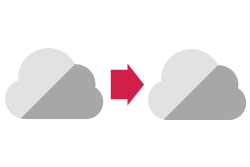When we ask our clients what their biggest struggles are as the administrator of a practice, we always hear “staying current with all of the lingo, specifically technology jargon.” Both healthcare and technology can change so quickly. It can be overwhelming to know what you need to know.
We’ve compiled a list of seven important technology terms that are commonly misrepresented, misunderstood or misused in clinical IT to help you stay educated on what matters.
Read More
Topics:
healthcare IT,
Healthcare IT trends,
Technology Terms
Healthcare organizations have been naturally migrating to the cloud, and for good reason. However, recent statistics show that choosing the right provider to effectively meet their unique needs can be challenging.
In the past year, the healthcare industry has seen a spike in the number of healthcare organizations switching their hosting providers. When evaluating why organizations are making the switch, we’ve found there are four primary reasons. The advice they’d give others is to ensure that the hosting provider you select meets these key standards:
Read More
Topics:
healthcare IT,
Health Information,
Private Cloud Hosting
Physician dependence on electronic systems has never been greater than it is now. Wholesale adoption of the Electronic Health Record (EHR), the digitalization of diagnostic imaging (PACS), and the emergence of intra-clinical sharing via Health Information Exchange (HIE); these forces combine to amplify the importance of the Information Technology (IT) staff, vendors, and other technical players that support the practice of medicine.
Read More
Topics:
healthcare IT,
EHR
In Part I of The Benefits of Moving to the Cloud, we discussed how cost effective, scalable, and secure it is to implement a cloud solution for your healthcare Information Technology (IT) needs. While these are great benefits, there are even more reasons a cloud IT solution is ideal for small hospitals and offices with multiple physicians who are short on IT staff, but high on demand for quality healthcare services.
Read More
Topics:
healthcare IT,
cloud-computing,
IT solutions
There is one task that must be completed not later than December 31st, 2014 in order to be successful for the 2015 Meaningful Use reporting period. For everyone who is attesting for their second year of Meaningful Use and beyond, next year is currently scheduled to be a full year.
Read More
Topics:
Meaningful Use,
healthcare IT,
cloud-computing
Earlier this year Robert E. Watson, president and CEO, Streamline Health wrote an article for Healthcare IT News in which he discussed the exploding growth of IT in healthcare applications. In this article he states, “In a matter of years, the healthcare industry has changed from measuring the size of data in terabytes and petabytes to exabytes and even zettabytes—and this volume of data is doubling every year.”
This rapid increase in Healthcare IT (HIT) volume could well be one of the key reasons for an increased trend for hospitals toward outsourcing these functions. An article in Becker’s Hospital Review last fall indicated that “The U.S. healthcare IT outsourcing market is expected to grow by 42.8 percent in the next five years”.
Read More
Topics:
healthcare IT,
Security Breaches,,
outsourcing
Keeping up with HIPAA and healthcare IT regulations can be a full-time job, if it is done in-house. However, most companies can outsource the liabilities associated with non-compliance by hiring Information Technology (IT) experts who can make sure the small hospital or physician’s office is in compliance, even when they aren’t aware of all the details. This can reduce the need to hire in-house technology experts who spend a lot of their time just keeping informed on HIPAA and healthcare IT issues. It also provides a much leaner IT workforce, but one that is uniquely qualified to provide the four basic offerings necessary to be in compliance: protecting data, limiting and managing access to sensitive medical information, implementing disaster recovery and emergency protocols when necessary, and monitoring network security.
Read More
Topics:
healthcare IT,
IT team,
HIPAA,
IT security
Outsourcing healthcare IT services has been growing at a fast pace over the past few years. Small hospitals and large physician practices may need to outsource the IT functions, in which case it would be a good idea to find experts who can offer excellent quality services. There are many experts who can offer you those quality services. You just need to make sure that you are working with the most experienced and skilled professionals.
Read More
Topics:
healthcare IT,
Outsourced IT,
Support Team
Healthcare Information Technology is a Very Dynamic Entity
Read More
Topics:
healthcare IT,
Flash Storage
Technology is ever-evolving, and as a result the industries which rely on technology the most need to be able to evolve as well. Healthcare IT is no exception. As of 2014, the ONC has issued a set of standards and requirements which all healthcare practices must follow.
Read More
Topics:
Meaningful Use,
healthcare IT,
EHR
 Support
Support Contact Us
Contact Us












